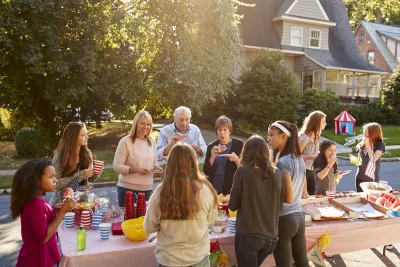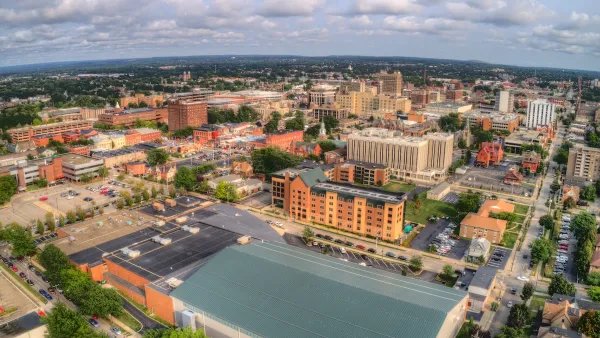How a humble neighborhood get-together can help build stronger cities.

In a piece for Strong Towns, Emma Durand-Wood offers “three reasons block parties are a highly valuable, underused tool for building stronger places.”
According to Durand-Wood, block parties have three important functions:
- Reducing fear and building trust: Block parties offer an opportunity to meet in a comfortable, casual environment with no agenda or polarizing issue. Too often people meet their neighbors when something goes wrong.
- Fostering community and creating agency: Getting to know neighbors can make a community more resilient to change and ready to act when needed. “Relationships built on a single issue may have some success in the short term. However, truly strong, powerful and enduring relationships are based on genuine interest, care and concern for your neighbors.”
- Dreaming big and starting small: One small event can help connect neighbors with similar interests and build long-term bonds that lead to further interaction.
As a bonus, Durand-Wood adds that block parties can also be a way for hard-working activists to restore and recharge among their neighbors and friends. Whether it’s an expansive event with street closures or a simple backyard barbecue, “The time we spend getting to know the people on our streets and in our neighborhoods, regardless of the scale of the gathering, is an investment that will never go to waste.”
FULL STORY: 3 Reasons Your Neighborhood Should Start Throwing Block Parties

National Parks Layoffs Will Cause Communities to Lose Billions
Thousands of essential park workers were laid off this week, just before the busy spring break season.

Retro-silient?: America’s First “Eco-burb,” The Woodlands Turns 50
A master-planned community north of Houston offers lessons on green infrastructure and resilient design, but falls short of its founder’s lofty affordability and walkability goals.

Delivering for America Plan Will Downgrade Mail Service in at Least 49.5 Percent of Zip Codes
Republican and Democrat lawmakers criticize the plan for its disproportionate negative impact on rural communities.

Test News Post 1
This is a summary

Test News Headline 46
Test for the image on the front page.

Balancing Bombs and Butterflies: How the National Guard Protects a Rare Species
The National Guard at Fort Indiantown Gap uses GIS technology and land management strategies to balance military training with conservation efforts, ensuring the survival of the rare eastern regal fritillary butterfly.
Urban Design for Planners 1: Software Tools
This six-course series explores essential urban design concepts using open source software and equips planners with the tools they need to participate fully in the urban design process.
Planning for Universal Design
Learn the tools for implementing Universal Design in planning regulations.
EMC Planning Group, Inc.
Planetizen
Planetizen
Mpact (formerly Rail~Volution)
Great Falls Development Authority, Inc.
HUDs Office of Policy Development and Research
NYU Wagner Graduate School of Public Service





























